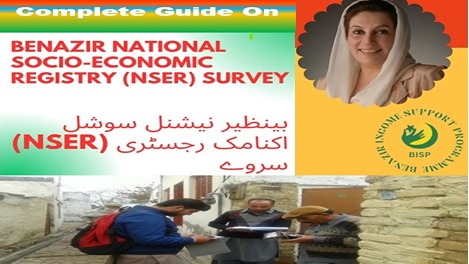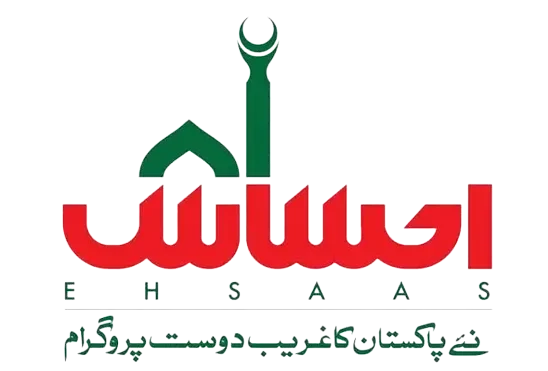Benazir National Socio-Economic Registry (NSER) Survey
Facing financial hardship and believe you might qualify for the Benazir Income Support Program (BISP)? Struggling to understand how to enroll or provide your information? The National Socio-Economic Registry (NSER) Survey is the solution to all problems.

Launched in 2011 alongside BISP, the Benazir National Socio-Economic Registry (NSER) Survey acts as a vital step. By collecting data nationwide, it identifies individuals and families who meet the BISP eligibility criteria. In simpler terms, the NSER Survey could be your pathway to receiving BISP’s valuable financial assistance.
Let’s explore how to get involved in the NSER Survey and unlock the potential benefits of BISP.
What is the National Socio-Economic Registry?
The National Socio-Economic Registry (NSER) of Pakistan is a large database containing socio-economic information on Pakistani households. Established in 2011, it was initially created through a nationwide survey that visited nearly every household in the country. This initial effort gathered data from over 27 million households. Recent updates have expanded the registry to cover roughly 35 million households.
The information collected by NSER focuses on a household’s socio-economic status, including details like income, housing conditions, ownership of assets, and access to basic necessities. This data serves as a valuable resource for the Pakistani government.
Benefits of Benazir National Socio-Economic Registry (NSER) Survey
The Benazir National Socio-Economic Registry (NSER) Survey offers a number of advantages, both for citizens and for government agencies in Pakistan. Here are some of the key benefits:
- Improved Targeting for Social Programs: The NSER data allows the Benazir Income Support Programme (BISP) and other social safety net programs to identify those most in need. This ensures help goes to deserving households and reduces waste.
- Efficiency and Transparency: By having a single registry, government agencies can avoid duplication of efforts and simplify the process of beneficiary selection. This can save time and money.
- Data for Planning and Development: The NSER provides valuable data on the socio-economic state of the population. This data can be used by policymakers to identify areas of greatest need and design more effective programs.
- Potential for Wider Use: The NSER data, when protected, can be shared with authorized organizations for research purposes. This can help researchers understand poverty trends and develop better solutions.
- Platform for Other Initiatives: The NSER can serve as a foundation for other social welfare programs, promoting better coordination and collaboration between government and non-governmental organizations.
How Does NSER Work?
The National Socio-Economic Registry (NSER) in Pakistan works in a few steps:
- Data Collection: Initially, a significant effort was undertaken to collect data on nearly all households in the country. This likely involved door-to-door surveys by trained staff.
- Data Storage: The collected information is then stored in a central registry. This registry contains details about a household’s socio-economic status, including income, housing conditions, and household members.
- Data Updates: The NSER isn’t a fixed record. Systems are in place to update the data periodically. This might involve new surveys, online portals for self-reporting changes, or verification through national databases like NADRA (National Database and Registration Authority).
- Targeting Beneficiaries: Social safety programs like the Benazir Income Support Programme (BISP) rely on NSER data to identify eligible beneficiaries. The data allows them to target those most in need based on pre-defined criteria.
- Transparency and Validation: To ensure accuracy and equity, the NSER data goes through validation processes. This might involve checks against other records or even independent verification by a third party.
Who is Eligible for the NSER Survey?
The NSER survey itself doesn’t determine eligibility for social programs. Instead, the data it collects is used to calculate a score on the Proxy Means Test (PMT), which determines if a household qualifies for various BISP programs like the Ehsaas program.
Here’s an overview of factors that generally influence eligibility for BISP programs based on NSER data:
- Income Levels: Households scoring below a specific limit on the PMT (typically around 40%) are considered for benefits. This limit translates to a monthly income range, though exact figures can vary.
- Asset Ownership: Ownership of expensive assets like cars or excessive property can negatively impact your PMT score.
- Disability Status: Households with members who have disabilities may be eligible for additional benefits or receive a higher score on the PMT.
- Government Employment: If any member of the household holds a government position, it might affect eligibility.
Documents required for NSER Registration
BISP selects households for surveys to update the NSER. However, if you’re approached for an NSER survey, here are the documents you’ll likely need to have available:
CNIC: This is the primary identification document required for most government services in Pakistan.
Proof of Residence: This could include utility bills (electricity, water, gas) in your name or a family member’s name, or a house registration certificate.
Income Certificate (optional): Depending on the specific survey, they might request an income certificate as verification.
Family Registration Certificate (optional): In some cases, they might ask for a family registration certificate to verify household information.
NSER Registration Form Online
There are two methods to follow to register online for NSER survey:
Online Portal:
- Visit the official ehsaas online application site and find the NSER registration link.
- Enter your correct information including CNIC number of all household members, contacts and profits details.
Nadra Service Centers:
Visit your nearest Nadra office with your CNIC. Staff will help you with filling out the NSER registration form.
NSER Survey Registration Check by CNIC Online
You can check your registration from CNIC online by following these steps:
- Enter your CNIC number and send it to 8171.
- Submit the form and then you’ll receive a reply.
- If you’re not eligible they will send you a message like ( Aap ka record maujood nahi).
NSER Check Balance
To check details of NSER balance follow these steps:
- Send your CNIC number to 8171.
- Visit the nearest BISP center, official BISP site, and NSER Nadra Gov PK Site.
- Contact the BISP helpline number at 0800-26477.
All these steps can help you know your balance details.
FAQs
Q: What Information Does the NSER Survey Collect?
The NSER survey gathers a wide range of information on various aspects of a household’s socioeconomic status. Here are some key areas covered:
- Household demographics (number of members, age groups)
- Housing conditions (type of dwelling, ownership status)
- Access to basic amenities (water, sanitation, electricity)
- Asset ownership (land, livestock, household goods)
- Sources of income and livelihood
- Educational attainment of household members
Q: What is the purpose of the NSER survey?
The NSER survey aims to build a comprehensive socio-economic profile of Pakistan by gathering data from households. This data is used to identify beneficiaries for social programs and improve their targeting.
Q: How to check eligibility for the NSER survey?
You can check eligibility by sending your CNIC number to 8171 then you’ll get information about your eligibility status.
Q:What is the BISP helpline number?
The 0800-26477 is the BISP helpline number. For any guidance and detail you can contact them.
Conclusion:
The National Socio-Economic Registry (NSER) is like a massive record book for Pakistani households. It has information about millions of families, including their income, housing, and what they own. This information helps the government decide who needs help the most. Social programs can then target these families for things like cash assistance or scholarships. The NSER also helps the government understand poverty in Pakistan better, so they can create even better programs in the future.
